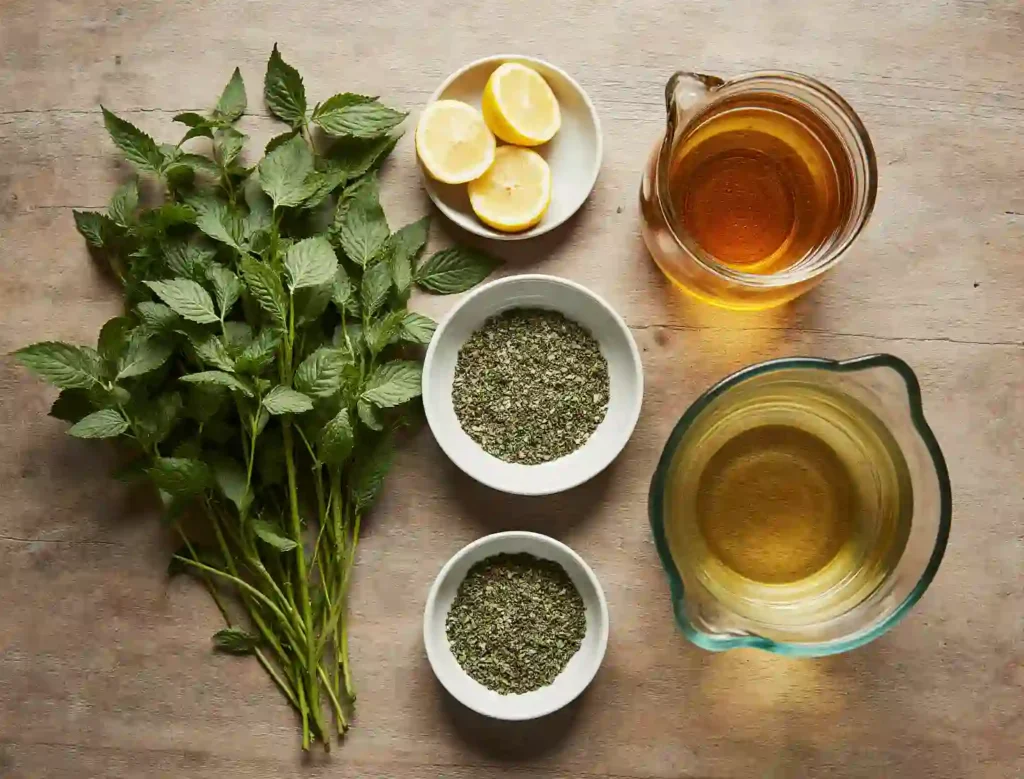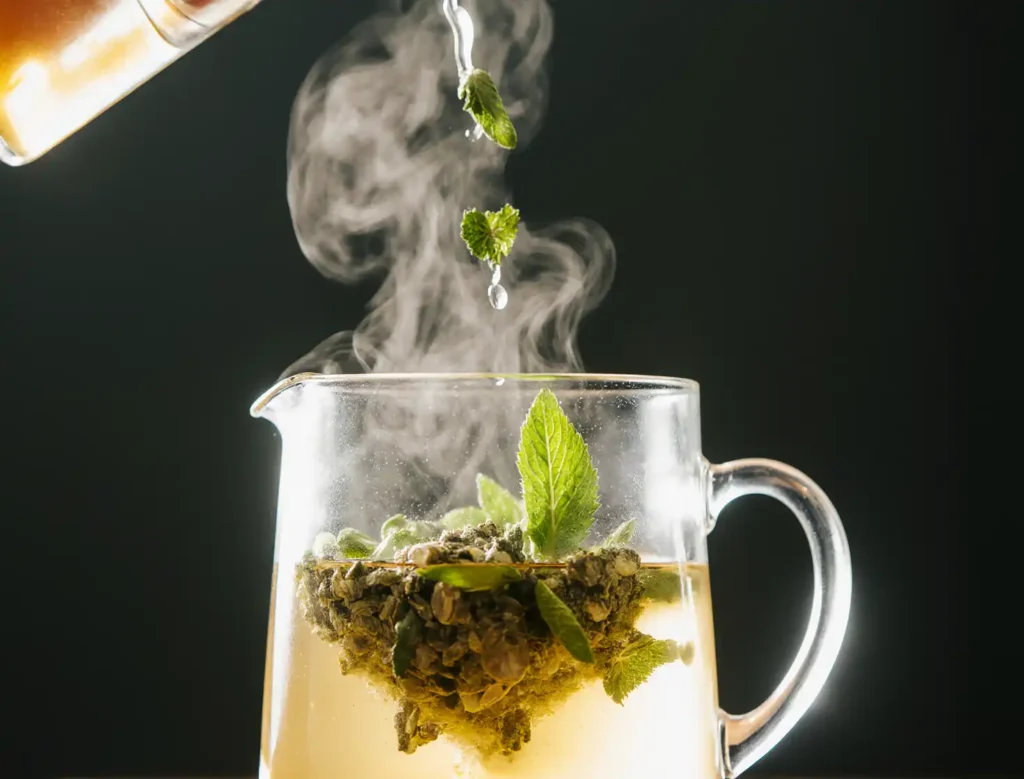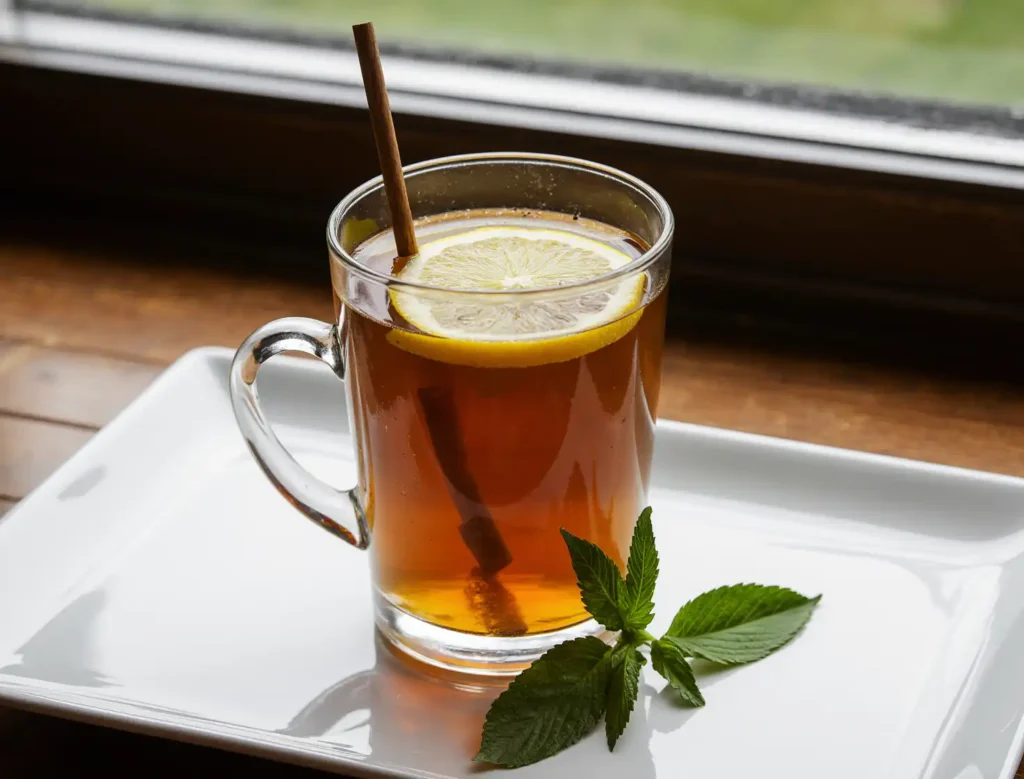Welcome to a calming read all about stress relief lemon balm tea—a gentle herbal tea that’s been soothing anxious hearts for centuries. In Part 1, we’ll kick things off with a warm introduction, including a personal story and insights into how this tea fits into everyday life. Then, we’ll explore its calming benefits, the science behind it, and who should or shouldn’t drink it. We’ll also walk you through how to make the perfect cup and include answers to your most searched questions.

Table of Contents
Table of Contents
How I Found Calm in a Cup of Stress Relief Lemon Balm Tea
The first time I brewed a cup of stress relief lemon balm tea, I was desperate for something to soothe my frazzled nerves. The day had been long—my inbox overflowing, laundry forgotten in the washer, and my mind spinning. While picking up a few pantry staples, I noticed a bundle of dried lemon balm leaves at the co-op. A gentle nudge from a nearby shopper—who called it “nature’s chill pill”—was all the encouragement I needed.
That night, I steeped a handful of the herb in hot water. The scent alone—citrusy, sweet, and calming—started to settle me. And by the time I took that last sip, the tension I’d been holding in my shoulders had melted. I didn’t feel drowsy. I felt clear. That was the moment stress relief lemon balm tea became part of my nightly routine.
Now, whenever life feels a little too loud, I reach for it. Whether I’m easing into a quiet morning or winding down after a big day, this tea helps me reset. It’s easy to make, gentle on the body, and incredibly comforting. Plus, there’s a surprising amount of research showing how well it works for mood and anxiety—especially when paired with recipes like this soothing lemon balm recipe I love to prep ahead.
If you’ve never tried stress relief lemon balm tea, let me tell you—it’s one of those small changes that can bring big peace. Some even say it works better than trendy supplements, like in this lemon balm recipe better than Ozempic that’s been getting a lot of buzz.
Quick Takeaway: Why You’ll Love Stress Relief Lemon Balm Tea
Stress relief lemon balm tea is a gentle, herbal tea known for easing anxiety, calming the nervous system, and supporting sleep. Made from Melissa officinalis, it’s been used for centuries in traditional medicine—and it’s making a well-deserved comeback today. Best of all, you can enjoy it daily with no grogginess or side effects.
In this guide, I’ll share:
- How lemon balm actually works to relieve stress
- Who should use it—and who should skip it
- Tips for brewing the perfect calming cup
- Honest answers to your most common tea questions
Ready to add a little calm to your cup? Let’s keep going.
How Lemon Balm Tea Works for Stress and Anxiety
The Natural Science Behind Stress Relief Lemon Balm Tea
So what makes stress relief lemon balm tea so effective for calming the mind? It’s all about what’s inside those lemon-scented leaves. Lemon balm, also known as Melissa officinalis, is rich in plant compounds that have been shown to positively impact the nervous system—especially when it comes to stress, worry, and mood swings.
Two of the biggest stars in lemon balm are rosmarinic acid and terpenes. These natural chemicals interact with GABA receptors in the brain, which are like your body’s “chill out” buttons. GABA helps slow down nervous system activity, promoting a sense of calm. Lemon balm may increase GABA availability, which explains why many people feel more grounded after sipping a cup.
Clinical studies also back this up. In small human trials, lemon balm has been shown to reduce self-reported anxiety, nervousness, and sleep disturbances. In fact, one 2014 study found that lemon balm extract reduced anxiety symptoms in just one to two hours—no groggy side effects, no synthetic sedatives.
When brewed as tea, lemon balm’s active properties are gently extracted by hot water. That means you’re sipping not just a cozy cup, but a warm infusion of calming botanical support.
Why It’s a Gentle and Safe Choice
One of the reasons I recommend stress relief lemon balm tea so often—especially for friends new to herbs—is because it’s gentle. It’s caffeine-free, non-habit forming, and usually well-tolerated by most people. That makes it a perfect option for daily use or for those trying to support their mental wellness in a more natural way.
It also plays nicely with other calming herbs. You can blend lemon balm with chamomile, lavender, or even a little peppermint for extra flavor and function. But even on its own, lemon balm offers a peaceful pause you can feel.
Need something cooling for summer? Try making an iced version and pair it with hydrating, uplifting drinks like our costco fruit smoothie recipe—a perfect match for chill mornings or sunset sipping.
If you’re feeling curious and want a tea that works with your body instead of against it, stress relief lemon balm tea might be the gentle hero you didn’t know you needed.
How to Brew and Use Stress Relief Lemon Balm Tea Safely
Brewing the Perfect Cup of Stress Relief Lemon Balm Tea
Making stress relief lemon balm tea is simple and satisfying—no fancy gadgets or rare ingredients needed. Whether you’re using fresh leaves from your garden or dried lemon balm from your local co-op, the process is the same and just as calming as the tea itself.
Here’s how I make it at home:

How to Brew Lemon Balm Tea (Hot or Iced):
| Ingredient | Amount |
|---|---|
| Dried Lemon Balm | 1–2 teaspoons per cup |
| Fresh Lemon Balm | 1 tablespoon per cup |
| Water | 1 cup (just below boiling) |
| Steep Time | 8–10 minutes |
Steps:

- Place lemon balm in a tea infuser or directly in your cup.
- Pour hot (not boiling) water over the leaves.
- Cover your mug (this helps trap the calming oils!).
- Let steep for 8–10 minutes, then strain and sip.
You can enjoy it plain or sweeten with honey or a slice of lemon. In warmer months, I love turning this into a refreshing iced version—just brew it double strength and pour it over ice.
It pairs beautifully with light, cooling recipes like our refreshing pineapple cucumber salad, especially if you’re using the tea to wind down after a sunny afternoon.
How Often Can You Drink It?
For most people, stress relief lemon balm tea can be enjoyed 1–3 times daily. Morning is great for setting a calm tone for the day. Mid-afternoon? A perfect pause before the dinner rush. And evening? It’s a gentle way to transition into rest—especially if you’re someone who tends to overthink at bedtime.
If you’re drinking it regularly, try starting with one cup a day and see how your body responds. Everyone’s system is different, and part of the beauty of herbal tea is learning to listen to your own rhythm.
Who Should Avoid Lemon Balm?
While stress relief lemon balm tea is safe for most, there are a few situations where it’s smart to check with your doctor first:
- Thyroid conditions: Lemon balm may interfere with thyroid hormones.
- Pregnancy or breastfeeding: There’s limited research, so always consult your care provider.
- Medications for anxiety, sleep, or thyroid: Talk to your doctor before combining herbs with prescription meds.
If you’re unsure, take a peek at our full lemon balm recipe guide—it covers safe use, plus a few creative ways to use lemon balm in your kitchen beyond tea.
Always start small and stay curious. Your body will tell you what it needs.
FAQ
Does lemon balm tea actually help with stress?
Yes, stress relief lemon balm tea has been shown to help reduce stress and anxiety. It contains compounds like rosmarinic acid that help calm the nervous system by supporting GABA activity in the brain. GABA is a neurotransmitter that tells your body to relax. Sipping lemon balm tea encourages gentle mental clarity and ease—without sedating you.
In fact, studies have found that people drinking lemon balm extract or tea felt less anxious, more focused, and emotionally balanced within a short period. It’s not a magic fix, but it’s a natural and soothing way to support your emotional well-being.
What happens when you drink lemon balm tea every day?
Drinking stress relief lemon balm tea daily may help reduce symptoms of stress, improve mood, and even support restful sleep. Some people notice fewer racing thoughts, improved focus, or a deeper sense of calm during hectic days.
The key is consistency. A cup once a week won’t do much—but one every day? That’s when people begin to feel the difference. Just like you might sip our purple cabbage juice regularly for its nutrients, lemon balm tea works best when it’s part of your everyday rhythm.
Who should not take lemon balm tea?
While lemon balm is generally safe, certain people should avoid or be cautious:
Those with hypothyroidism: Lemon balm may interfere with thyroid hormone function.
Pregnant or breastfeeding women: There’s limited safety data, so consult your doctor first.
People taking sedatives or thyroid medications: Always check with your healthcare provider to avoid interactions.
If you’re unsure, ease in slowly and pay attention to how your body responds. Natural doesn’t always mean harmless—so use it wisely.
How fast does lemon balm work for anxiety?
Lemon balm can begin working within 30 minutes to 2 hours after drinking a cup, depending on your body and how much you consume. Some people report feeling relaxed within minutes; for others, it’s more subtle.
For long-term support, consistency matters. Daily use helps build up its calming effect over time. Think of it like a gentle wave instead of a crash—it lifts you gradually and keeps you afloat.
Final Thoughts

Stress relief lemon balm tea is more than just a cozy herbal drink—it’s a gentle companion for anyone feeling overwhelmed, anxious, or overstimulated. Whether you’re just starting out with herbal teas or you’re looking to replace synthetic options with something more natural, lemon balm offers a warm, approachable path toward calm.
It’s simple to make, soothing to sip, and full of centuries-old wisdom. Add it to your wellness ritual and see how even one cup can invite more peace into your day.
Print
Stress Relief Lemon Balm Tea: Sip Your Calm Naturally
- Total Time: 15 minutes
- Yield: 1 cup
- Diet: Vegan
Description
A calming herbal tea made from lemon balm leaves that naturally reduces stress and promotes relaxation. This simple, caffeine-free remedy helps support your nervous system and bring a sense of calm to your day.
Ingredients
1–2 tsp dried lemon balm (or 1 tbsp fresh)
1 cup hot water
Optional: honey, lemon, or chamomile
Instructions
Boil water and let it cool slightly (do not use boiling water).
Add lemon balm to a tea infuser or directly into your cup.
Pour hot water over the lemon balm.
Cover and steep for 8–10 minutes.
Strain if needed, then sweeten with honey or lemon if desired.
Enjoy warm or iced, once or twice daily.
Notes
Start with 1 cup per day and increase if needed.
Great in the evening to unwind before bed.
Avoid if you have thyroid conditions or take sedative medications.
You can blend with other calming herbs like chamomile or lavender for added flavor and effect.
- Prep Time: 5 minutes
- Cook Time: 10 minutes
- Category: Drinks
- Method: Steeping
- Cuisine: Herbal
Nutrition
- Calories: 2
- Sugar: 0g
- Sodium: 0mg
- Fat: 0g
- Saturated Fat: 0g
- Unsaturated Fat: 0g
- Trans Fat: 0g
- Carbohydrates: 1g
- Fiber: 0g
- Protein: 0g
- Cholesterol: 0mg


